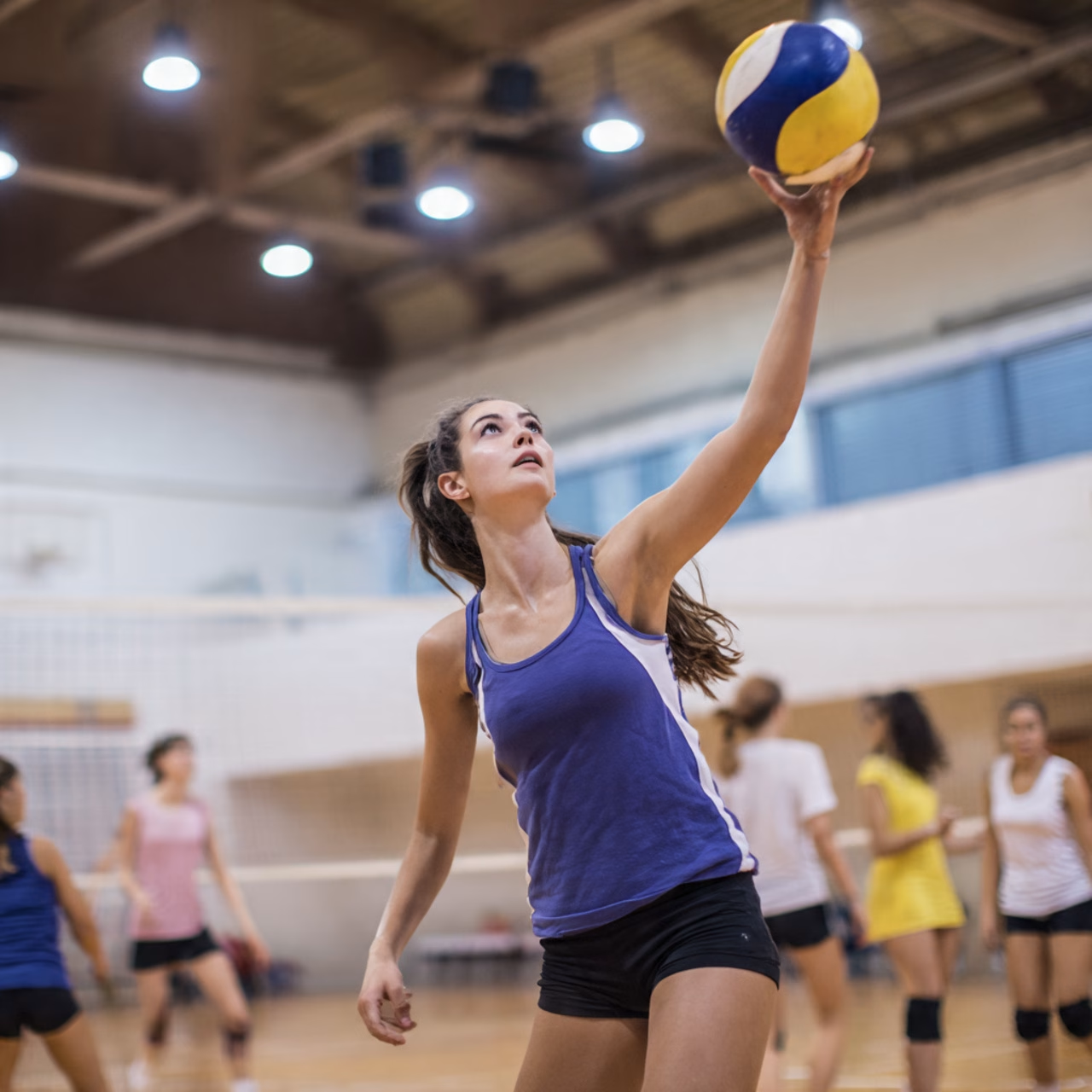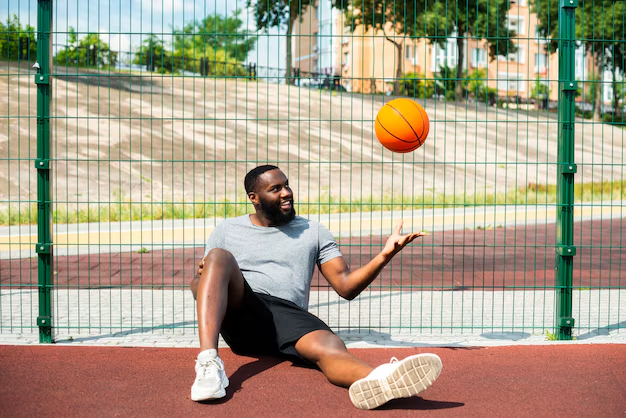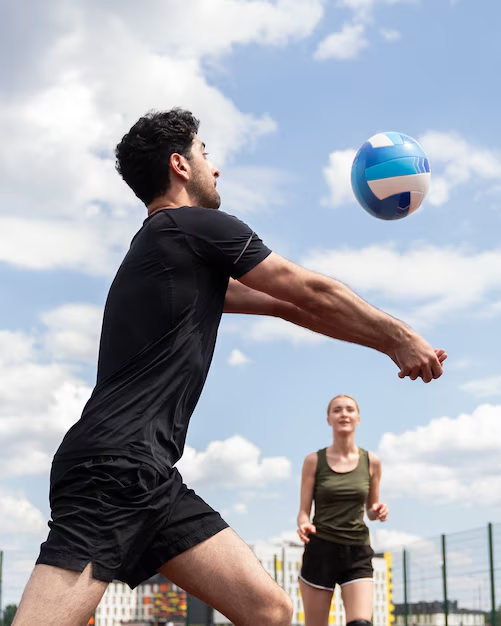Volleyball is a dynamic and exciting sport that requires a unique blend of physical ability, teamwork, and strategy. Whether you’re playing casually at the beach or competing at a higher level, mastering the fundamental skills of volleyball is crucial for success. In this blog post, we will explore the 10 basic skills in volleyball for beginners that will set the foundation for your game.
1. Serving
Importance of Serving
Serving is the first action in a volleyball point and sets the tone for the play. A strong serve can put pressure on the opposing team and create scoring opportunities.
Types of Serves
- Underhand Serve: Ideal for beginners, this serve is easier to control and allows for a consistent toss and hit.
- Overhand Serve: More advanced, this serve can be powerful and difficult to receive if executed correctly. It involves tossing the ball high and hitting it with an open hand.
Tips for Practicing Serving
- Focus on your stance; feet should be shoulder-width apart.
- Use a consistent toss; aim for a height that allows for a clean hit.
- Practice both types of serves until you feel comfortable with each.
2. Passing
Role of Passing
Passing is crucial in volleyball as it allows your team to maintain control of the ball and set up plays. A good pass can lead to an effective attack.
Techniques for Passing
- Forearm Pass (Bump): This technique is used for low balls. Keep your arms straight and connected to create a solid platform.
- Set Pass: Used primarily by setters, this technique involves using the fingertips to direct the ball to a hitter.
Passing Practice Drills
- Pair up with a partner and practice forearm passes.
- Work on setting with a wall; aim for accuracy and consistency.
3. Setting
Understanding Setting
Setting is the act of directing the ball to a hitter, making it one of the most critical skills in volleyball. A well-executed set can lead to a successful attack.
Key Elements of Setting
- Hand Position: Use your fingertips and keep your hands above your forehead.
- Footwork: Position yourself under the ball to make an accurate set.
Setting Drills
- Practice setting against a wall to improve accuracy.
- Work with a partner to practice various set heights and angles.
4. Hitting
The Art of Hitting
Hitting is an offensive skill that involves attacking the ball with power and precision. It’s essential for scoring points.
Types of Hits
- Front Row Hit: Executed by jumping and striking the ball down into the opponent’s court.
- Back Row Hit: A more advanced move where players hit from the back row, often using a jump to gain height.
Hitting Practice Techniques
- Focus on your approach; take a few steps before jumping to build momentum.
- Aim to make contact with the ball at the highest point possible.
5. Blocking
The Importance of Blocking
Blocking is a defensive skill aimed at preventing the opposing team from successfully hitting the ball. A good block can turn the tide of a game.
Techniques for Effective Blocking
- Positioning: Stand in front of the hitter and jump at the right time.
- Arm Position: Keep your arms above your head and hands open to cover more area.
Blocking Drills
- Pair up and practice timing your jumps with a hitter.
- Work on your positioning to improve your blocking effectiveness.
6. Digging
What is Digging?
Digging is a defensive maneuver that involves receiving a hard-driven ball from the opposing team. It’s essential for maintaining rallies.
Techniques for Digging
- Low Stance: Keep your knees bent and stay low to the ground to react quickly.
- Use of Forearms: Similar to passing, use your forearms to control the ball back to your team.
Digging Practice
- Work with a partner to practice receiving hard hits.
- Use a wall to bounce balls back to yourself for solo practice.
7. Communication
The Role of Communication
Effective communication is vital in volleyball, as it ensures that players know their roles and responsibilities during play.
Tips for Clear Communication
- Use specific calls (like “mine” or “help”) to indicate who will play the ball.
- Encourage teammates with positive feedback and signals.
Communication Drills
- Practice calling for the ball during drills.
- Play games where communication is essential, such as 2-on-2 matches.
8. Teamwork
Understanding Teamwork in Volleyball
Volleyball is a team sport, and understanding how to work together is crucial for success. Good teamwork enhances coordination and strategy.
Building Team Chemistry
- Participate in team-building activities off the court.
- Practice specific plays during training to develop trust and familiarity among teammates.
Teamwork Exercises
- Engage in scrimmages to practice teamwork in real-game scenarios.
- Discuss strategies and plays as a team to enhance understanding.
9. Footwork
The Importance of Footwork
Good footwork allows players to position themselves effectively for passing, hitting, and serving. It enhances agility and balance.
Techniques for Improving Footwork
- Shuffling: Practice moving sideways quickly to get in position.
- Quick Steps: Work on taking quick, small steps to adjust your positioning.
Footwork Drills
- Set up cones and practice moving around them to improve agility.
- Incorporate ladder drills to enhance your foot speed.
10. Conditioning
The Need for Physical Conditioning
Volleyball requires a combination of strength, endurance, and agility. Proper conditioning helps players perform at their best throughout the game.
Key Areas of Focus
- Strength Training: Focus on building core strength for better stability.
- Endurance Training: Incorporate cardio exercises to improve overall stamina.
Conditioning Exercises
- Engage in circuit training that includes running, jumping, and bodyweight exercises.
- Include plyometric workouts to enhance explosiveness and agility.
Conclusion
Mastering these 10 basic skills in volleyball will provide a strong foundation for beginners looking to improve their game. Each skill plays a vital role in overall performance, and by focusing on these fundamentals, players can enhance their abilities and contribute effectively to their teams. Remember, practice is key, so dedicate time to refining these skills and enjoy the journey of becoming a better volleyball player!
By focusing on these essential volleyball skills, you’ll be well on your way to enjoying and excelling in the game. Whether you’re playing competitively or just for fun, the foundation you build with these skills will serve you well. Happy playing!




